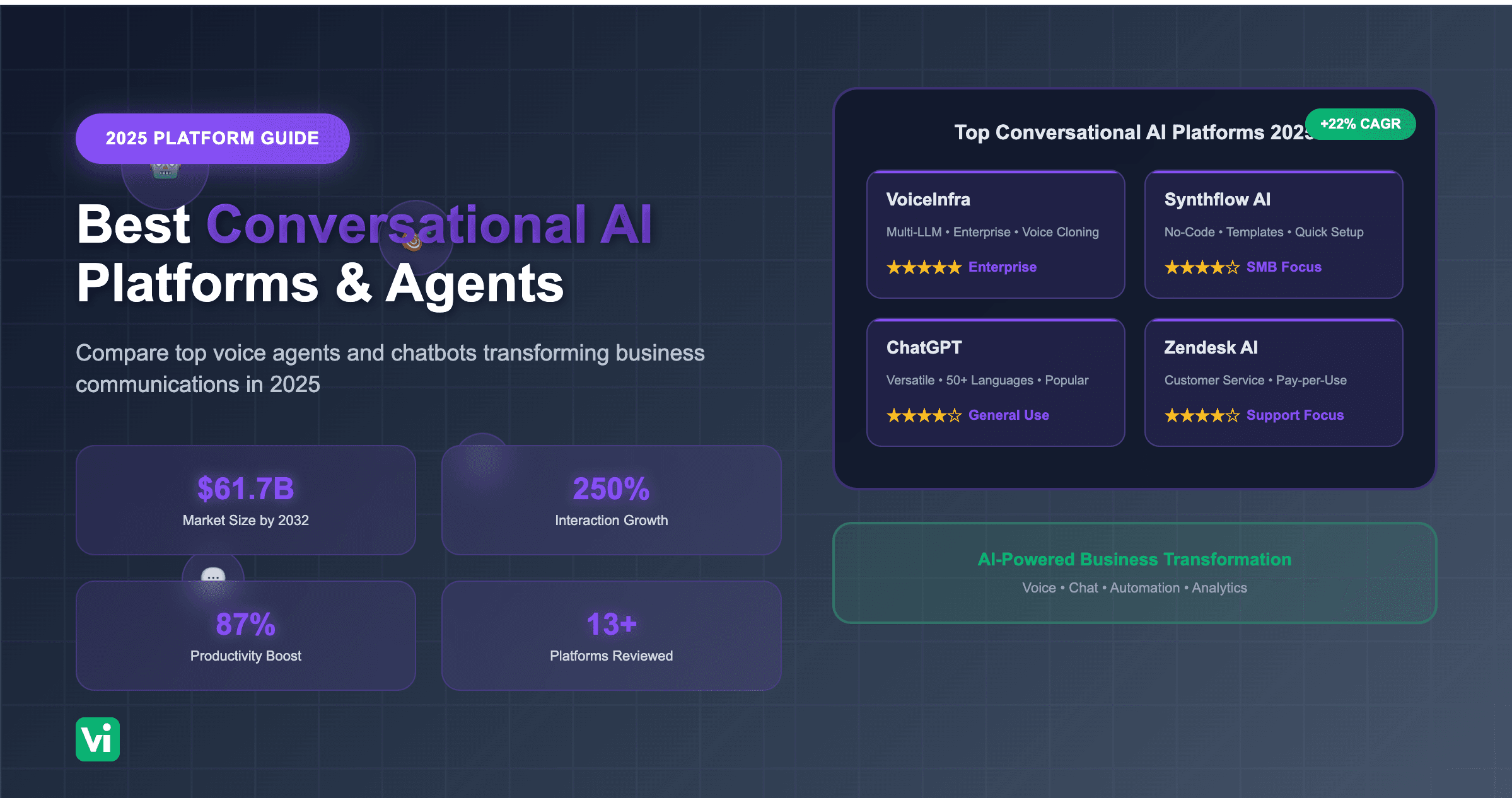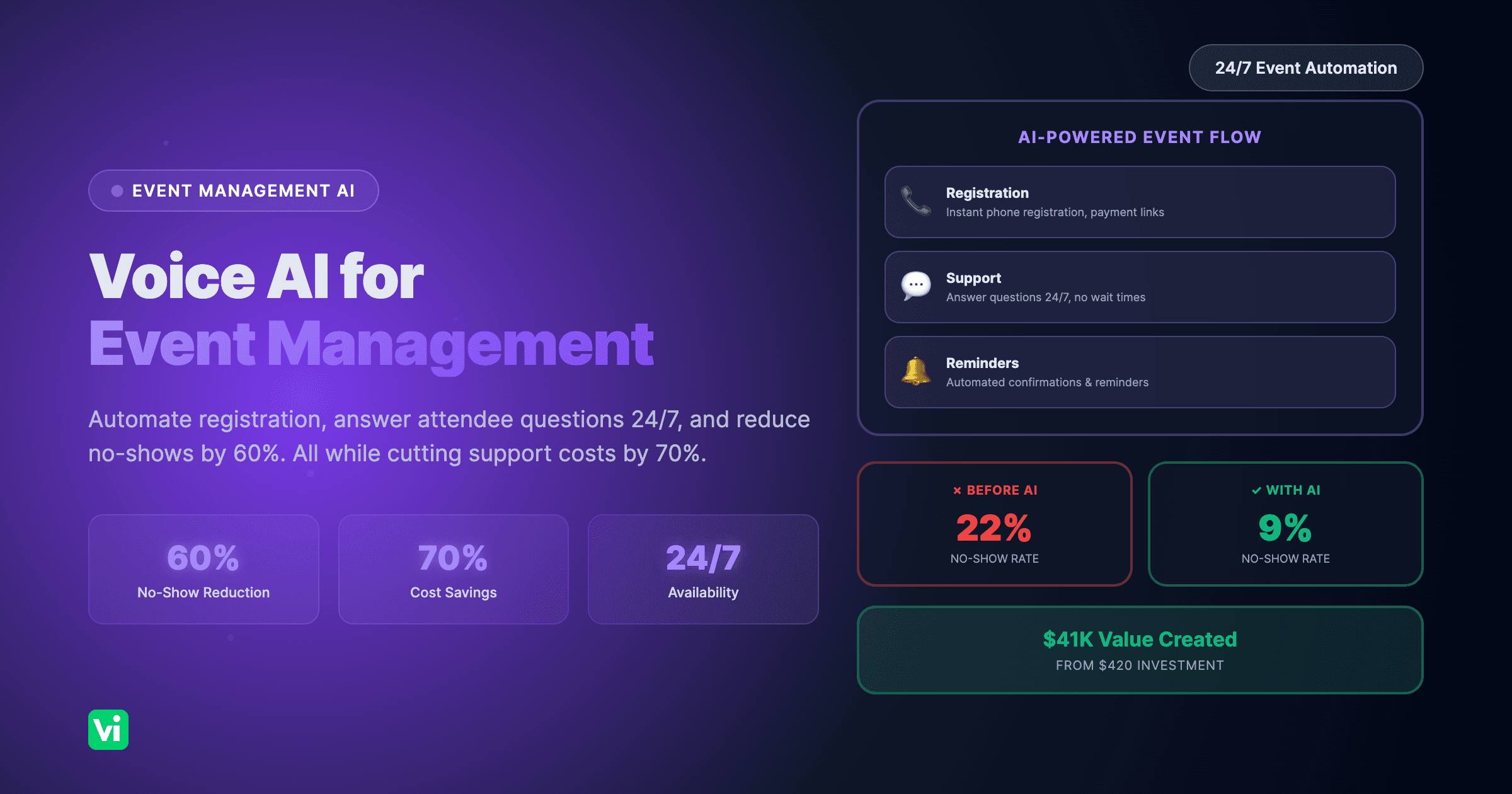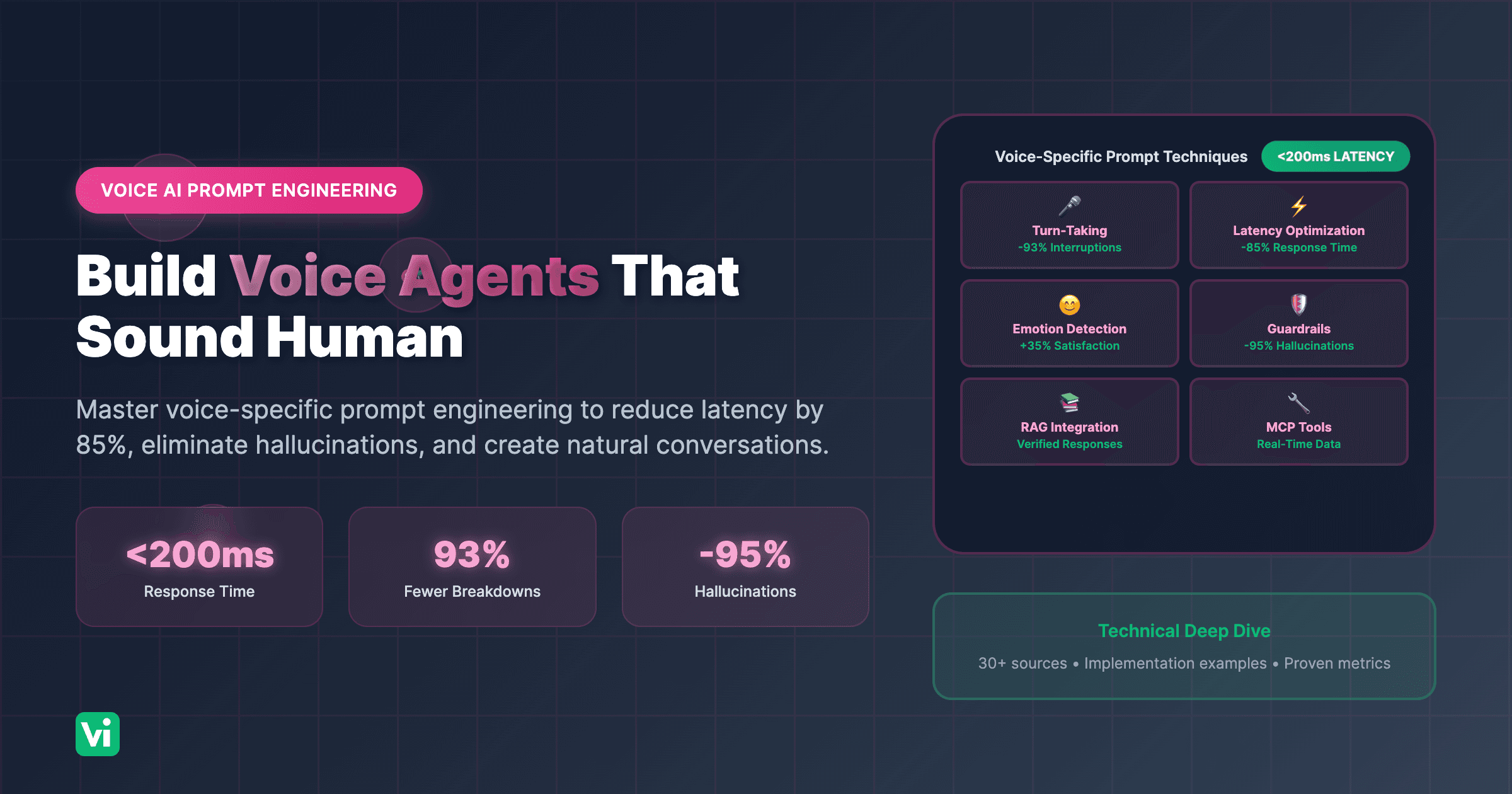Best Conversational AI Platforms & Agents for 2025: Complete Guide
The conversational AI revolution is reshaping how businesses interact with customers. With the global conversational AI market expected to grow from $12.24 billion in 2024 to $61.69 billion by 2032, organizations across industries are racing to implement intelligent voice agents and chatbots that deliver exceptional customer experiences.
But with dozens of platforms claiming to offer the "best" conversational AI, how do you choose the right solution for your business? This comprehensive guide examines the leading conversational AI platforms for 2025, their unique capabilities, and what makes each one stand out in an increasingly competitive market.
The Conversational AI Market Landscape in 2025
The numbers tell a compelling story about conversational AI adoption:
250% increase
in interactions handled by conversational agents across multiple industries
87% of businesses
report that conversational AI improves productivity
80% believe
these capabilities will be table stakes in the near future
71% of business professionals
have invested in chatbot technology
This explosive growth is driven by businesses seeking to provide 24/7 customer service, reduce operational costs, and scale their customer interactions without proportionally increasing staff.
Key Factors to Consider When Choosing a Conversational AI Platform
Before diving into specific platforms, it's crucial to understand what separates exceptional conversational AI from basic chatbots:
Industry Expertise and Specialization
Not all conversational AI platforms are created equal. Some excel in specific industries like healthcare or finance, while others offer broad applicability. Look for platforms with proven experience in your sector and understanding of industry-specific compliance requirements.
Natural Conversation Quality
The best conversational AI platforms create interactions that feel genuinely human. This includes:
Advanced natural language processing (NLP)
Context awareness and memory
Emotional intelligence and appropriate tone
Seamless handling of interruptions and complex queries
Integration Capabilities
Your conversational AI should work seamlessly with existing business systems:
CRM platforms (Salesforce, HubSpot, Zoho)
Phone systems and PBX infrastructure
Scheduling and appointment booking tools
Knowledge bases and documentation systems
Scalability and Performance
Consider platforms that can handle your current volume while scaling effortlessly during peak periods. The best solutions offer:
Unlimited concurrent conversations
Instant scaling without performance degradation
Global deployment capabilities
Robust uptime guarantees
Top Conversational AI Platforms for 2025
1. VoiceInfra - Enterprise AI Voice Agent Platform
VoiceInfra stands out as a comprehensive AI voice agent platform designed specifically for businesses seeking to transform their phone systems with intelligent conversational AI. What sets VoiceInfra apart is its multi-provider approach and enterprise-grade capabilities.
Key Strengths:
Multi-Provider LLM Architecture: Choose from OpenAI, Anthropic, Groq, Google/Gemini, and xAI for optimal cost and performance
Premium Voice Quality: Access to all major TTS providers including PlayHT, ElevenLabs, and Cartesia with voice cloning capabilities
Advanced Knowledge Management: RAG-powered system using Qdrant and Llama Index for intelligent document processing
Seamless Integration: Works with existing PBX systems (Avaya, Cisco, 3CX, Asterisk) without replacement
Real-Time Analytics: Comprehensive conversation intelligence and sentiment tracking
Best For: Businesses with existing phone infrastructure seeking enterprise-grade voice AI with advanced customization options.
Pricing: Contact for custom enterprise pricing based on usage and features.
2. Synthflow AI - No-Code Voice Agent Builder
Synthflow AI excels in providing a user-friendly, no-code platform for creating sophisticated voice agents. Their drag-and-drop interface makes conversational AI accessible to businesses without technical expertise.
Key Strengths:
No-code, drag-and-drop interface
Industry-specific templates for quick deployment
Integration with popular CRM tools
Multilingual support with various accents
Custom voice options including voice cloning
Best For: Small to medium businesses seeking quick deployment without technical complexity.
Pricing: Starting at $29/month (50 minutes) up to $1,400/month (6,000 minutes).
3. ChatGPT - Versatile Conversational AI
OpenAI's ChatGPT has become synonymous with conversational AI, offering broad capabilities across text-based interactions with recent voice integration.
Key Strengths:
Exceptional natural language understanding
Broad knowledge base and versatility
Strong integration ecosystem
Continuous model improvements
Multi-language support (50+ languages)
Best For: Businesses seeking general-purpose conversational AI with strong text-based interactions.
Pricing: Free tier available, paid plans from $20/month to $200/month
4. Zendesk AI Agent - Customer Service Focused
Zendesk's AI agents are purpose-built for customer service, offering seamless integration with their established ticketing and support ecosystem.
Key Strengths:
Deep customer service optimization
Seamless handoff to human agents
Multi-channel deployment (chat, email, messaging)
Pay-per-resolution pricing model
Strong analytics and reporting
Best For: Companies already using Zendesk or seeking customer service-specific AI.
Pricing: $1.50 per successful resolution, with volume discounts available.
5. IBM Watson Assistant - Enterprise-Grade Platform
IBM Watson Assistant offers enterprise-level conversational AI with strong security and compliance features, making it ideal for large organizations.
Key Strengths:
Enterprise security and compliance
Advanced NLP capabilities
Extensive integration options
Multi-channel deployment
Strong analytics and insights
Best For: Large enterprises requiring robust security, compliance, and scalability.
Pricing: Starting at $140/month for Plus plan, custom enterprise pricing available.
Specialized Conversational AI Solutions
Voice-First Platforms
Retell AI - Middleware solution for developers wanting to bring their own LLM and phone provider. Ideal for technical teams building custom solutions.
Vocode.dev - Open-source voice assistant platform offering maximum customization for developers comfortable with coding.
Industry-Specific Solutions
Slang AI - Restaurant-focused voice assistant for reservations and customer inquiries.
Healthcare Chatbots - Specialized platforms for medical practices, offering HIPAA compliance and medical knowledge bases.
Implementation Best Practices for 2025
Start with Clear Objectives
Define specific use cases and success metrics before selecting a platform:
Customer service automation goals
Expected call volume reduction
Target response time improvements
Integration requirements
Plan for Gradual Deployment
Successful conversational AI implementations typically follow a phased approach:
Pilot Phase: Start with basic FAQ and information requests
Expansion Phase: Add appointment scheduling and routine transactions
Optimization Phase: Refine based on real-world usage and feedback
Ensure Human Oversight
The best conversational AI platforms complement human agents rather than replace them entirely:
Complex problem-solving still requires human intervention
Emotional or sensitive situations need human empathy
High-value sales opportunities benefit from human expertise
Cost Considerations and ROI
Traditional vs. AI Solutions
Traditional Call Center Costs:
Recruitment and training: $2,000-5,000 per position
Hourly wages: $15-25/hour plus benefits
Management overhead and infrastructure
Seasonal staffing challenges
Conversational AI Benefits:
24/7 availability without additional staffing
Instant scaling during peak periods
Consistent service quality
Significant cost reduction (60-80% typical)
Measuring Success
Key metrics for conversational AI ROI:
Call abandonment rate: Target under 2%
Average response time: Under 30 seconds
Customer satisfaction scores: Maintain or improve existing levels
Cost per interaction: Track reduction from baseline
Revenue capture: Measure opportunities that would have been missed
Security and Compliance Considerations
When evaluating conversational AI platforms, ensure they meet your industry's requirements:
Essential Certifications:
SOC 2 compliance
GDPR compliance for European operations
HIPAA compliance for healthcare
PCI DSS for payment processing
ISO/IEC 27001 for information security
Data Protection Features:
End-to-end encryption
Data residency controls
Regular security audits
Transparent data handling policies
Future Trends in Conversational AI
Emerging Capabilities for 2025
Multimodal Interactions: Integration of voice, text, and visual elements for richer customer experiences.
Emotional Intelligence: Advanced sentiment analysis and emotional response capabilities.
Predictive Assistance: AI agents that anticipate customer needs based on historical data and context.
Real-Time Learning: Systems that continuously improve from every interaction without manual retraining.
Making the Right Choice for Your Business
Selecting the best conversational AI platform depends on your specific needs:
For Enterprise Organizations: Consider VoiceInfra or IBM Watson Assistant for comprehensive features and enterprise-grade security.
For Quick Deployment: Synthflow AI offers the fastest path to implementation with minimal technical requirements.
For Customer Service Focus: Zendesk AI Agent provides specialized customer support capabilities.
For Developer Teams: Retell AI or Vocode.dev offer maximum customization and control.
For Budget-Conscious Businesses: Start with platforms offering free tiers or pay-per-use pricing models.
Getting Started with Conversational AI
Implementation Timeline
Week 1: Platform selection and initial setup Week 2-3: Knowledge base creation and integration configuration Week 4: Testing and refinement Month 2: Gradual rollout and optimization Ongoing: Continuous monitoring and improvement
Success Factors
Clear Use Case Definition: Know exactly what you want to achieve
Stakeholder Buy-In: Ensure team alignment on goals and expectations
Quality Data: Provide comprehensive, accurate information for training
Ongoing Optimization: Regularly review and refine based on performance data
User Training: Ensure your team understands how to work with the AI system
Conclusion
The conversational AI landscape in 2025 offers unprecedented opportunities for businesses to enhance customer experience while reducing operational costs. Whether you choose a comprehensive platform like VoiceInfra for enterprise-grade voice capabilities, a user-friendly solution like Synthflow AI for quick deployment, or a specialized platform for specific use cases, the key is selecting a solution that aligns with your business objectives and technical requirements.
The businesses that thrive in 2025 won't be those with the biggest budgets—they'll be the ones that strategically implement conversational AI to create seamless, efficient, and genuinely helpful customer interactions.
Ready to transform your customer communications with AI?
Explore VoiceInfra's Enterprise AI Voice Agents →
VoiceInfra's AI voice agents integrate seamlessly with existing business phone systems, providing enterprise-grade conversational AI that scales with your business needs. Our multi-provider architecture ensures optimal performance and cost-effectiveness for organizations of all sizes.



